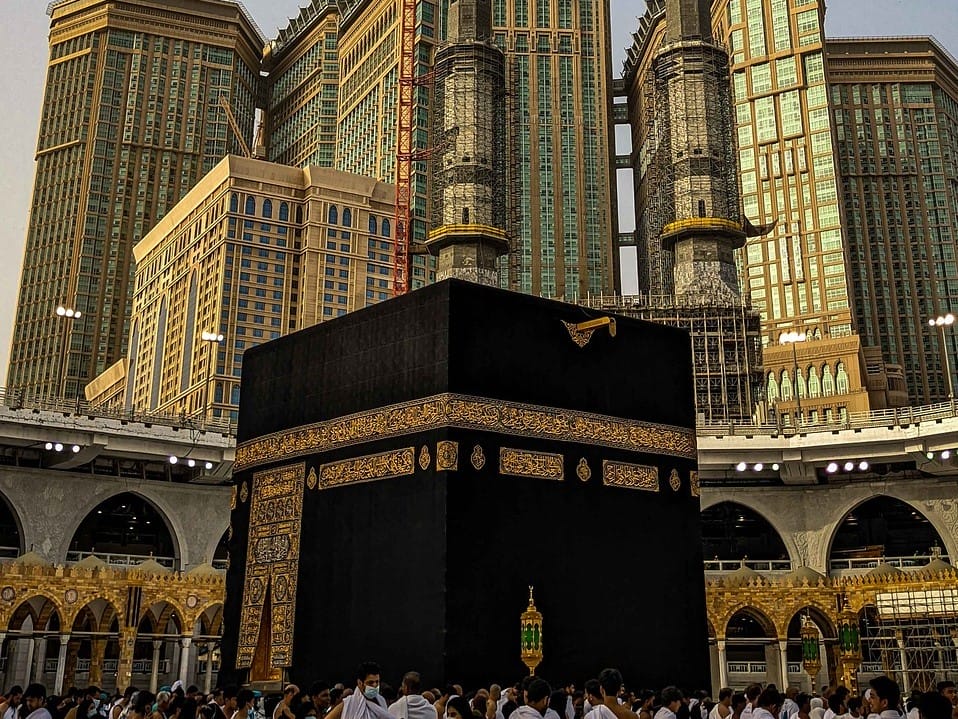Hajj, the annual pilgrimage to Mecca, holds immense historical and religious significance in Islam. The roots of Hajj can be traced back to the time of Prophet Ibrahim, who is considered the patriarch of monotheism in Islam. According to Islamic tradition, Prophet Ibrahim and his son Isma’il were instructed by Allah to build the Kaaba, the holiest shrine in Islam, as a place of worship. The rituals of Hajj are deeply rooted in the actions and sacrifices made by Prophet Ibrahim and his family. The historical context of Hajj also includes the life of Prophet Muhammad, who performed the pilgrimage in the year 632 AD, setting the precedent for Muslims to follow in his footsteps. The religious significance of Hajj lies in its status as one of the Five Pillars of Islam, which are the core beliefs and practices that every Muslim is expected to uphold. Hajj is a demonstration of faith, unity, and submission to Allah, and it serves as a reminder of the equality and brotherhood among all Muslims.
The pilgrimage to Mecca is a journey that has been undertaken by millions of Muslims throughout history, and it continues to be a central aspect of Islamic faith and practice. The historical and religious context of Hajj provides a framework for understanding the rituals and symbolism associated with the pilgrimage. It is a time for Muslims to reflect on their faith, seek forgiveness, and renew their commitment to Allah. The significance of Hajj extends beyond its historical and religious roots, as it also serves as a unifying force for Muslims around the world. The pilgrimage brings together people from diverse backgrounds and cultures, reinforcing the sense of community and solidarity among believers. The historical and religious context of Hajj underscores its importance as a sacred duty for Muslims and a source of spiritual fulfillment.
The Rituals and Symbolism of Hajj
The rituals of Hajj are steeped in symbolism and serve as a powerful expression of faith and devotion. The pilgrimage consists of several key rituals, each with its own significance and meaning. One of the central rituals of Hajj is the Tawaf, which involves circling the Kaaba seven times in a counterclockwise direction. This act symbolizes the unity of Muslims around the world, as they come together to worship Allah at the holiest site in Islam. Another important ritual is the Sa’i, which involves walking seven times between the hills of Safa and Marwah, commemorating the actions of Hagar, the wife of Prophet Ibrahim, as she searched for water for her son Isma’il. This ritual symbolizes perseverance and trust in Allah’s providence.
The symbolic significance of Hajj is further exemplified in the act of throwing pebbles at three pillars representing Satan during the ritual of Stoning the Devil. This ritual symbolizes the rejection of evil and temptation, as well as the triumph of good over evil. The culmination of Hajj is marked by the celebration of Eid al-Adha, which commemorates the willingness of Prophet Ibrahim to sacrifice his son Isma’il as an act of obedience to Allah. Muslims around the world participate in the sacrifice of an animal, symbolizing their willingness to make sacrifices in the name of faith. The rituals and symbolism of Hajj serve as a powerful reminder of the core values of Islam, including faith, submission to Allah, perseverance, and compassion.
Strengthening Your Faith through the Hajj Experience
The experience of Hajj is a transformative journey that has the potential to strengthen one’s faith in profound ways. The physical and spiritual challenges encountered during Hajj provide an opportunity for self-reflection, introspection, and spiritual growth. The rigorous nature of the pilgrimage, including long hours of walking, intense heat, and crowded conditions, tests the endurance and patience of pilgrims. These challenges serve as a means for Muslims to demonstrate their commitment to Allah and their willingness to endure hardship for the sake of their faith.
The experience of Hajj also fosters a sense of humility and gratitude among pilgrims. The act of performing rituals alongside millions of other believers from diverse backgrounds reinforces the idea that all Muslims are equal in the eyes of Allah. This sense of equality and unity serves as a powerful reminder of the core principles of Islam. The spiritual atmosphere of Hajj, combined with the collective acts of worship and supplication, creates a profound sense of connection with Allah and fellow believers. The experience of Hajj has the potential to deepen one’s understanding of faith, foster a greater sense of spirituality, and renew one’s commitment to living a life guided by Islamic principles.
Connecting with the Spiritual Legacy of Prophet Ibrahim
The story of Prophet Ibrahim holds immense significance in Islam, and his legacy is deeply intertwined with the rituals and symbolism of Hajj. Prophet Ibrahim is revered as a model of unwavering faith, obedience to Allah, and selflessness. His actions, including his willingness to sacrifice his son Isma’il at Allah’s command, serve as a source of inspiration for Muslims undertaking the pilgrimage to Mecca. The rituals associated with Hajj are rooted in the actions and sacrifices made by Prophet Ibrahim and his family, making it a deeply spiritual experience that connects pilgrims with his legacy.
The act of performing Tawaf around the Kaaba symbolizes the unity and devotion exemplified by Prophet Ibrahim and his family. The Sa’i ritual commemorates Hagar’s search for water for her son Isma’il, highlighting her resilience and trust in Allah’s providence. The act of Stoning the Devil represents Prophet Ibrahim’s rejection of evil and temptation, as well as his unwavering commitment to Allah’s commandments. The celebration of Eid al-Adha through the sacrifice of an animal mirrors Prophet Ibrahim’s willingness to make sacrifices in obedience to Allah. Connecting with the spiritual legacy of Prophet Ibrahim during Hajj serves as a powerful reminder of the values he embodied and provides inspiration for pilgrims to emulate his example in their own lives.
The Importance of Unity and Equality in Hajj
Hajj serves as a powerful demonstration of unity and equality among Muslims from around the world. Regardless of their social status, ethnicity, or nationality, all pilgrims are required to dress in simple white garments known as Ihram, symbolizing their equality before Allah. The collective performance of rituals such as Tawaf, Sa’i, Stoning the Devil, and prayer at Mount Arafat reinforces the idea that all Muslims are equal in their devotion to Allah. This sense of unity and equality is further exemplified by the fact that pilgrims come from diverse backgrounds and cultures, yet they are united in their shared faith.
The importance of unity and equality in Hajj extends beyond the physical acts performed during the pilgrimage. It serves as a powerful reminder that all Muslims are part of a global community bound by their faith in Allah. The experience of performing rituals alongside millions of other believers fosters a sense of solidarity and brotherhood that transcends cultural and national boundaries. This sense of unity is further reinforced by the collective supplications made by pilgrims for forgiveness, guidance, and blessings from Allah. The importance of unity and equality in Hajj underscores the core principles of Islam, including compassion, empathy, and respect for all members of the Muslim community.
Overcoming Challenges and Obstacles in the Hajj Journey
The journey of Hajj is not without its challenges and obstacles, both physical and spiritual. Pilgrims face long hours of walking in crowded conditions, extreme heat, limited access to amenities, and logistical challenges related to accommodation and transportation. These physical challenges test the endurance and patience of pilgrims but also serve as an opportunity for personal growth and spiritual reflection. Overcoming these obstacles requires resilience, determination, and reliance on Allah’s guidance.
In addition to physical challenges, pilgrims may also encounter spiritual obstacles during their journey. The intense spiritual atmosphere can evoke feelings of vulnerability, humility, and self-awareness. Pilgrims may confront their own shortcomings, seek forgiveness for past mistakes, or grapple with doubts about their faith. Overcoming these spiritual obstacles requires introspection, self-examination, and a renewed commitment to living a life guided by Islamic principles. The journey of Hajj provides an opportunity for pilgrims to confront their inner struggles, seek spiritual purification, and emerge with a renewed sense of faith and purpose.
Carrying the Lessons of Hajj into Your Daily Life
The experience of Hajj has the potential to leave a lasting impact on pilgrims long after they have returned home. The lessons learned during Hajj can be carried into daily life, serving as a source of guidance and inspiration for living a life guided by Islamic principles. The sense of unity and equality experienced during Hajj can inspire individuals to foster greater compassion, empathy, and respect for others in their communities. The acts of sacrifice made during Eid al-Adha can serve as a reminder to be generous and charitable towards those in need.
The experience of overcoming challenges during Hajj can instill a sense of resilience, determination, and reliance on Allah’s guidance that can be applied to facing difficulties in everyday life. The spiritual growth experienced during Hajj can inspire individuals to deepen their connection with Allah through regular acts of worship such as prayer, fasting, charity, and seeking knowledge about Islam. Carrying the lessons of Hajj into daily life requires a commitment to embodying the values exemplified during the pilgrimage – faith, humility, perseverance, compassion – in all aspects of one’s life.
In conclusion, Hajj is a transformative journey that holds immense historical, religious, and spiritual significance for Muslims around the world. The rituals and symbolism associated with Hajj serve as powerful expressions of faith, unity, equality, and devotion to Allah. The experience of Hajj has the potential to strengthen one’s faith, connect with the spiritual legacy of Prophet Ibrahim, foster unity among believers from diverse backgrounds, overcome challenges both physical and spiritual, and carry lessons learned into daily life. Ultimately, Hajj is not just a physical journey but a spiritual odyssey that has the power to transform hearts and minds for years to come.

